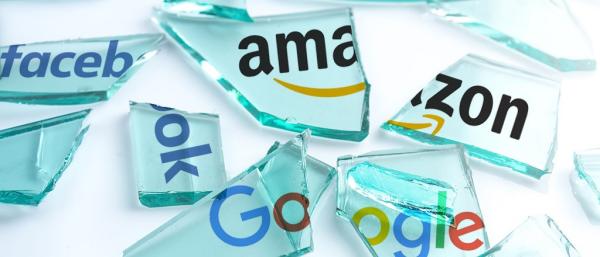Don't break up Big Tech? Of course
It’s always nice to see somebody get it. Even if partially.

Breaking up Big Tech, said Zachary Karabell on Wired, “won’t protect small businesses, it won’t preserve our data privacy, and it won’t help promote democracy”.
Of course it won’t. I have been saying the same thing for years now. Let’s see why Karabell says so.
Everybody wants to “break them up”. Everybody is wrong.
“Break them up”, says Karabell, is one of the few areas of American life that can be considered truly bipartisan. Still, the use of antitrust laws to break up Big Tech would almost certainly fail to satisfy their goals.
Karabell gives four main reasons, why he thinks so, with plenty of details. But gives the least space to the most important one.
Antitrust? Which Antitrust?
To begin with, says Karabell, antitrust enforcement has been romanticized well in excess of its accomplishments. The breakup of AT&T, Standard Oil accomplished much less, in the medium and long term, than what they are reputed to have. See the article for details.
Competition? Which competition?
If Big Tech companies were “strong-armed into disassembling themselves” there would be a multiplication of industry players. That would create a more competitive field by definition. But by itself, competition does not guarantee anything. It is just an aspiration to ends like “economic liberty”. And even “limiting the number and scale of acquisitions that Big Tech companies can make in any given year” may accomplish very little on that front.
Democracy? Which democracy?
“There is no past evidence that large, dominant companies imperil democracy; AT&T and IBM had de facto monopolies in the 1960s and 1970s over telephony and computers when democracy in the United States was becoming ever more inclusive.”
Data ownership? Which ownership?
So far, I agree with everything Karabell wrote. Except his assertion that the goal is to “effectively balance consumer needs and economic liberty”. Many of the “needs” involved in this issue are not real needs, but addictions that create real problems, regardless of how many companies are behind them. Not to mention the general fact that the more we speak of citizens, instead of consumer, the better it is.
At the end of the article, Karabell does touch the real, real reason why “breaking up Big Tech” would accomplish nothing, but without really looking it it:
- It’s hard to see how going from six companies to 30 would give consumers any more choice of services or more control over their data
- Perhaps it’s not size per se but, rather, the nature of today’s companies - not the “big,” just the “tech” - that is at the heart of such problems.
It’s not the size!
Finally! It’s not the size, but the nature of the companies and of what they offer. The real answer is there. Forget breaking up Big Tech: Einstein would not be happy. Instead, just make Big Tech:
That will make Big Tech much less harmful than it is today. And it is also way simpler to implement.
Image source: “Why Breaking Up Big Tech Could Do More Harm Than Good”
Who writes this, why, and how to help
I am Marco Fioretti, tech writer and aspiring polymath doing human-digital research and popularization.
I do it because YOUR civil rights and the quality of YOUR life depend every year more on how software is used AROUND you.
To this end, I have already shared more than a million words on this blog, without any paywall or user tracking, and am sharing the next million through a newsletter, also without any paywall.
The more direct support I get, the more I can continue to inform for free parents, teachers, decision makers, and everybody else who should know more stuff like this. You can support me with paid subscriptions to my newsletter, donations via PayPal (mfioretti@nexaima.net) or LiberaPay, or in any of the other ways listed here.THANKS for your support!